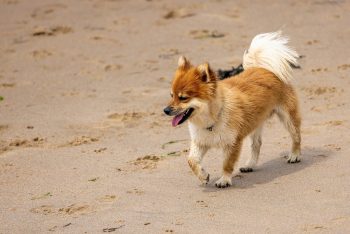In the world of dog ownership, prospective pet parents often weigh the joy and companionship dogs bring against the potential challenges, including health issues that some breeds are predisposed to. While no breed is entirely free from health concerns, certain lesser-known breeds are celebrated for their robust health and fewer genetic predispositions to serious medical conditions. Opting for a breed with fewer health issues can lead to a more stress-free pet ownership experience, with potentially fewer veterinary visits and more time spent enjoying each other’s company. This article highlights 7 lesser-known dog breeds known for their general robustness and minimal health concerns, providing valuable insights for those looking to welcome a new four-legged friend into their home.
1. Basenji
The Basenji, often referred to as the “African Barkless Dog,” is not unique for its lack of barking but also for its overall good health. This ancient breed is known for its independence, intelligence, and cat-like grooming habits, which contribute to its clean bill of health. Basenjis are less prone to common canine odors and have minimal grooming needs due to their short coat. They are generally robust, with few inherited health problems, though they can sometimes be prone to Fanconi syndrome, a manageable condition with early detection. Their active nature and curiosity make them delightful companions for those looking for a low-maintenance and healthy breed.
2. Australian Terrier
The Australian Terrier is a small but spirited breed, originally bred for hunting and guarding. These terriers are known for their hardiness and were developed to withstand the challenging Australian outback. This background contributes to their overall good health and longevity. Australian Terriers have a weatherproof coat that requires minimal grooming and are not known to suffer from many of the genetic disorders that afflict other small breeds. With proper care, regular exercise, and a healthy diet, they can be joyful and vibrant companions for many years.
3. Greyhound
Though not exactly lesser-known, Greyhounds are often overlooked for their health due to the prominence of racing lines. However, non-racing Greyhounds are remarkably healthy dogs with few genetic health issues. They are prone to a couple of conditions, such as bloat and sensitivity to anesthesia, but these risks can be managed with attentive care. Greyhounds have short coats that are easy to maintain and generally enjoy good dental health due to their strong jaws. Their gentle and laid-back nature, combined with their robust health, makes them excellent pets.
4. Finnish Spitz
The Finnish Spitz, the national dog of Finland, is known for its fox-like appearance and lively disposition. This breed has retained much of its natural health and vigor through careful breeding practices focused on preserving its hunting capabilities. They are known to be very vocal but also incredibly healthy, with few hereditary conditions. Finnish Spitzes require regular exercise to match their energetic nature, and with a proper diet, they tend to live long healthy lives. Their dense coat needs regular grooming but does not typically present significant health issues.
5. Swedish Vallhund
The Swedish Vallhund, an ancient breed known for its resemblance to a Corgi, boasts a history steeped in Viking lore. Renowned for their role as herders and watchdogs, Vallhunds possess robust health, largely free from the genetic ailments that afflict many other breeds. Their compact size and energetic demeanor hide a sturdy constitution that has been refined over centuries. Regular exercise and a balanced diet help maintain their health, while their easy-to-groom coat requires minimal upkeep. The Swedish Vallhund’s spirited nature, combined with its healthful longevity, makes it an ideal companion for those seeking a lively and enduring pet.
6. Lancashire Heeler
The Lancashire Heeler, originally bred for herding and driving cattle, is a small but mighty breed known for its versatility and cheerful disposition. Despite their working-class roots, healers have adapted well to family life, bringing joy and minimal health worries. They are prone to some conditions like primary lens luxation, but responsible breeding practices have aimed to minimize these risks. Their short coat is easy to care for, requiring only basic grooming, and their adaptability makes them suitable for various lifestyles, proving that great companions come in small, hearty packages.
7. Icelandic Sheepdog
The Icelandic Sheepdog, Iceland’s only native breed, is a resilient and cheerful companion that has thrived in harsh Nordic conditions for centuries. This breed is known for its good health, longevity, and spirited personality. While they are active and require regular exercise, their maintenance needs are relatively low, with a coat that withstands the elements and only requires regular brushing. Icelandic Sheepdogs are sociable, rarely showing signs of aggression, and their genetic pool, while small, has been carefully managed to ensure the breed’s health and preservation.
While all dogs can bring immeasurable joy and companionship into our lives, choosing a breed known for its good health can enhance this relationship by minimizing the stress and worry over potential genetic health issues. These 7 lesser-known breeds not only offer the benefits of fewer inherited health problems but also embody a range of sizes, personalities, and care needs, ensuring there’s a perfect match for almost any home. Each breed presents an opportunity to enjoy the wonders of dog ownership with the added peace of mind that comes from their general robustness and vitality.
The post 7 Lesser-Known Dog Breeds With the Least Health Issues appeared first on iHeartDogs.com.

